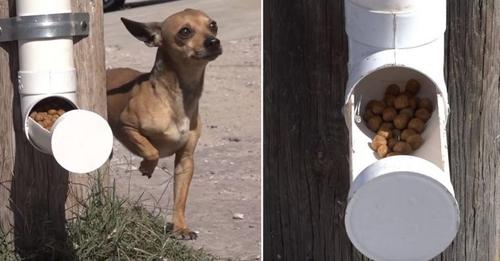
The Mexican city of Soledad de Graciano Sanchez is a bright example of how people may aid homeless dogs by proactively combining animal-loving volunteers with unique government services.
According to local officials, Graciano Sanchez has 300,000 homeless dogs roaming the streets. Recognizing that the dogs require at the very least food, water, and basic medical care, the city and local animal lovers banded together to assist the homeless pets.
One of their initial projects was the creation of the “ComeDog” campaign. ComeDog teams together with City Hall to form Respuesta Ciudadana, a local citizens group. They work together to put food dispensers in public places so that street dogs can have fresh food and water. The dispensers are long-lasting and easy to fill, as they are made of PVC.
Respuesta Ciudadana is in responsibility of maintaining the dispensers stocked, and fifteen have been installed and are currently in use. The volunteers distribute the food and make friends with the dogs who come to the feeding stations to fill their appetites.
The program’s success, according to Mayor Gilberto Hernandez Villafuente, is due to the collaboration between the city and the volunteers:
“Today, I realize how much people enjoy this initiative; we’ve been congratulated in various ways, and now I’m going to ask you to join us in making this refuge a huge success.”
Ambudog, Mexico’s first animal ambulance, was also revealed by the city. Ambudog is a non-profit organization that aids street dogs and other pets in the community. Veterinarians are on hand to provide free medical care to the city’s cats and canines. Free spay and neuter services, as well as immunizations, are available. They expect that by implementing the scheme, they will be able to reduce the spread of preventable diseases and the overpopulation of pets, both of which contribute to their misery.
Director of Municipal Services Dolores Elisa Garca Román Soledad de Graciano Sánchez expressed herself as follows:
“When the puppy is born, there is an infectious picture, and if it is not vaccinated within a month and a half, primarily against distemper or parvovirus, there is a contagion, both in people and animals, then this ambulance will be taken to all the suburbs to attend to all the puppies,” says the doctor.
These two programs, according to the city, are just the beginning. They hope that by setting an example, other people will follow in their footsteps and help Mexico’s homeless dogs find food, shelter, love, and permanent homes.
We hope that the initiative expands beyond Mexico and serves as a model for countries around the world. Please tell your family and friends about this incredible story. We can work together to put an end to animal suffering.
